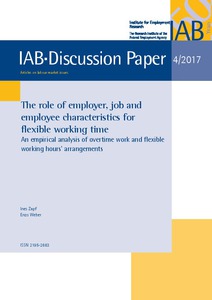The role of employer, job and employee characteristics for flexible working time. An empirical analysis of overtime work and flexible working hours' arrangements
"Modern working societies face the challenge to combine the establishments' with the employees' needs for working-time flexibility. The authors investigate the determinants of overtime and different working hours' arrangements using the German Linked Employer-Employee Study of th...
| Main Authors: | , |
|---|---|
| Institution: | ETUI-European Trade Union Institute |
| Format: | TEXT |
| Language: | English |
| Published: |
Nürnberg
2017
IAB |
| Subjects: | |
| Online Access: | https://www.labourline.org/KENTIKA-748112456639-The-role-of-employer,-job-and-.htm |
| Summary: | "Modern working societies face the challenge to combine the establishments' with the employees' needs for working-time flexibility. The authors investigate the determinants of overtime and different working hours' arrangements using the German Linked Employer-Employee Study of the Socio-Economic Panel (SOEP-LEE) and logistic regression models. The results show that employer and job characteristics are most important for determining overtime and the different working hours' arrangements, underlining the power of employers with regard to working-time flexibility. Employee characteristics play the least important role, although employees can flexibly organize their working times and can benefit from certain arrangements, such as self-determined working hours and flexitime within a working hours account. The study provides evidence that working-time flexibility in Germany is mainly employer-oriented. However, through demographic changes and a possible lack of qualified personnel, employee- friendly arrangements are likely to gain importance." |
|---|---|
| Physical Description: | 44 p. Digital |

